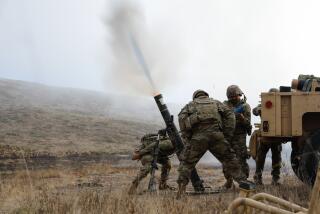Closure Plan Stuns Tustin Base’s Civilian Neighbors : Community: City officials say the economic impact would be severe. And beyond that, many friendships would come to an end.
TUSTIN — For as long as many residents can remember, this suburban community sprinkled with mom-and-pop businesses has been home to the sprawling Tustin Marine Corps Helicopter Air Station.
As is often the case in long-term relationships, the military base and its civilian neighbors have not always agreed. Over the years, there have been standing disputes over of issues ranging from the deafening whir of helicopters over homes to environmental hazards posed by the 1,600-acre base.
With the passage of time, however, residents of this city of 50,000 and the 4,000 Marines stationed at the base have settled into a comfortable relationship that most assumed would never end.
But all that changed Friday with an announcement by Secretary of Defense Dick Cheney that the Pentagon wants to shut down the hometown air station, and others nationwide, to cut costs. The Tustin facility, a helicopter base and smaller sister station to the El Toro Marine Corps Air Station, is the only Marine base proposed for closure by the Pentagon.
News of the potential closing of the community’s largest employer stunned many residents.
“They have the city’s largest payroll, and they are a very integral part of our economy,” City Councilman Earl J. Prescott said. “They spend millions and millions of dollars here.”
Al Shifberg-Mencher, an accountant, agreed: “I think if it goes through, it’s going to be a great loss to the community, both economically and I want to say culturally,” he said. “But it’s more than that. It would mean losing a lot of friends as well.”
That sentiment was echoed by others who actively supported local Marine families during the Persian Gulf War.
Debbie Gravitt, co-owner of a restaurant near the base, said the Marines have become like extended family members. “They’ve always been good customers,” Gravitt said. “If we have any problems in the bar, they’re always willing to help out.”
Like many local merchants, Gravitt fears the base closure would mean a drastic drop in business. “About 30% of our lunch and bar business is Marines,” she said.
Across the Santa Ana Freeway, Home Depot assistant manager Shawn Kirby also predicted declining sales. He estimated that customers from the Tustin base spend $20,000 to $40,000 each week at the store.
Many in town held onto the hope that Chamber of Commerce spokeswoman Tova Griffin, who said the news caught business leaders unawares, predicted a base-closing would hit small businesses the hardest, noting that many merchants complained about declining sales during the Gulf War.
Marines from neighboring El Toro would continue to be housed at the Tustin base because of an acute shortage of military housing. But if the base is closed entirely, officials predict a substantial loss in sales tax revenue and state funds from gas, cigarette and liquor taxes. These funds are reimbursed to cities based upon their population.
Meanwhile, school officials in Tustin and Irvine predicted their own revenue losses if the Marines move away. At Tustin Unified School District for example, the closing of the base would mean a loss of $1.1 million if the 300 students living on the base leave.
“If it were to happen today, it would be a severe blow,” said Paul Fisher, business administrator for the Tustin school district.
At Los Naranjos Elementary School in Irvine, where 45% of the students have parents stationed at the base, the Marines’ absence would have a dramatic effect.
“It’s like going to any school and all of a sudden half of your children are going to disappear--all of the relationships that you’ve built up,” said Bruce Baron, the principal. “I think right now our tactic is going to be to go on as if nothing happened.”
Over the years, the small farming community has grown up around the Marine air station, which was first built in 1942 to house military blimps. Later, with the advent of modern technology in the 1950s, the military converted the base into a helicopter air station.
In 1976, Tustin annexed the base, ending a nine-year fight with Santa Ana for control of it.
Although the city has forged a close relationship with the base, it has not been trouble-free. Last year, the U.S. Environmental Protection Agency cited the air station for sloppy, illegal handling and storage of hazardous materials. The EPA said 11 sites at the base were contaminated with jet fuels, acids, waste oils and toxic solvents.
Neighboring homeowners also have voiced concern about the dangers associated with the CH-53E Super Stallion helicopter after a series of fatal crashes involving the aircraft.
However, the major sore spot with homeowners who live near the base has been the deafening noise generated by about 10,000 helicopter flights per year--80% of which cross over Tustin. Though Tustin officials say the base has been responsive to their concerns and recently sent a letter to Cheney in support of the base’s operation, neighboring Irvine has protested helicopter flights over its city for years. Officials there were pleased by Friday’s Pentagon announcement.
“If it does close, I think it will be seen as positive for the residents who’ve endured the helicopter overflights over the years,” Irvine Councilwoman Paula Werner said.
Irvine City Manager Paul O. Brady Jr. agreed, adding that Irvine has been pushing for the relocation of the Tustin base for years due to numerous resident complaints. He said the noise probably affects Irvine more than Tustin because of the flight patterns.
But some Irvine officials were wary.
“We know what we have today. We don’t know what our neighbors will be tomorrow,” Brady said. “Sometimes the unknown is worse than the known.”
More to Read
Sign up for Essential California
The most important California stories and recommendations in your inbox every morning.
You may occasionally receive promotional content from the Los Angeles Times.










